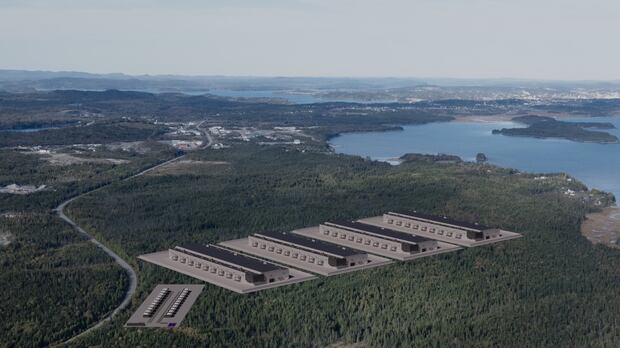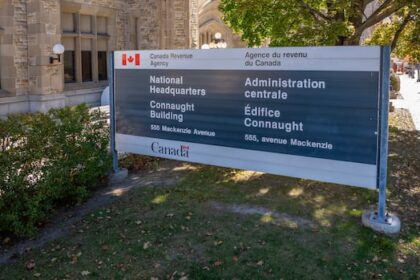New Brunswick·NewA proposed data centre in the Lorneville area of Saint John would gobble up the equivalent of almost half the electricity N.B. Power will get from a controversial natural gas plant in the Tantramar area.‘Zero link’ between projects, CEO says; Green MLA calls situation ‘backwards in so many ways.” Jacques Poitras · CBC News · Posted: Nov 12, 2025 5:00 AM EST | Last Updated: 30 minutes agoListen to this articleEstimated 5 minutesThe audio version of this article is generated by text-to-speech, a technology based on artificial intelligence.Lorneville data centre would have huge electricity appetiteProponents want N.B. Power to supply equivalent of half the electricity from Tantramar gas plant.A proposed data centre in the Lorneville area of Saint John would gobble up the equivalent of almost half the electricity N.B. Power will get from a controversial natural gas plant in the Tantramar area.That number, volunteered by one of the partner companies promoting the data centre, is raising new questions about N.B. Power’s ability to meet electricity demand and the impact on greenhouse gas emissions.“It’s huge,” Green Party leader David Coon said of the comment by Volta Grid CEO, Nathan Ough, that he and his partners expect to use 190 megawatts of electricity from N.B. Power starting in 2028.“It looks like they’ll be drawing from, if it goes ahead, the new gas plant in Tantramar,” Coon said.“That’s a lot of greenhouse gas emissions in the atmosphere.” Volta Grid CEO, Nathan Ough, said the data centre would consume about 380 megawatts of power. (Nipun Tiwari/CBC)Ough told Lorneville residents at a public meeting that the data centre, which will house a large number of computers for data storage, artificial intelligence processing, server hosting and other uses, would consume about 380 megawatts of power.He said half would come from the company’s own natural gas generation onsite, and half would come from the N.B. Power grid.Even 190 megawatts is a large amount for N.B. Power, which says it needs 400 megawatts from the Tantramar natural gas plant to avoid a potential shortfall of electricity due to population growth as early as 2028.ProEnergy, the U.S. company that would build the gas plant, is seeking approval for 500 megawatts of generation, but says only 400 will be for N.B. Power and the rest will be installed if other buyers are identified.The plan has provoked strong opposition from many Tantramar residents as well as environmentalists and conservation groups.N.B. Power says the plant will contribute to a net reduction in greenhouse gas emissions because it will run only when it’s needed to back up new renewable power such as wind turbines when they’re not generating.Green Party Leader David Coon questioned if intermittent use of the gas plant will be enough once the Lorneville data centre is operating. (CBC News)But Coon questions whether that intermittent use of the gas plant will be enough once the Lorneville data centre is operating.Energy Minister, René Legacy, said the ongoing review of N.B. Power will examine how it should respond to demands for electricity from potential data centres proposals in the future.“Any new kind of large loads is always an issue,” he said.Ough said there is “zero link” between Volta Grid’s project and the Tantramar plant.“They are mutually exclusive to each other and are not connected,” he wrote in an email.Ough also told CBC News Monday that because the data centre would have its own power generation, it should not be seen as a “demand hog,” but as a project that could contribute electricity back onto the grid during periods of peak demand.Such data centres “are amazing assets for the grid.”Data centres as economic opportunities for N.B.Two years ago the Higgs government banned N.B. Power from selling electricity to crypto mines, which also use large amounts of power for thousands of computers that run around the clock to earn units of virtual currency.Hive Digital Technologies, a crypto mine that opened in Grand Falls before the ban, recently bought new land to add a data centre to its operations.The company told CBC News the expansion won’t require more electricity than the current 70 megawatts the crypto mine uses.The company “intends to use its existing power agreements,” said director of marketing Nathan Fast.Hive Digital Technologies, a crypto mine that opened in Grand Falls before the ban, recently bought new land to add a data centre to its operations. (Shane Fowler/CBC)Legacy argued data centres are different from crypto mines and represent an economic development opportunity for the province, and an important tool Canada can use to promote “data sovereignty,” ensuring the country’s digital information isn’t stored in the United States.“I don’t think New Brunswick can sit on the sidelines of that,” he said.“We can’t just close the province to new commerce, to new industry, to growth. We’re going to need this.”’Backwards in so many ways’At last week’s public meeting, the CEO of Volta Grid’s partner company, Joseph Shovlin of Beacon AI, said they have a plan if N.B. Power won’t or can’t supply power to the data centre.“This gentleman here will provide the power and we’ll be totally disconnected,” he said, pointing to Ough.It wasn’t clear where Volta Grid would find the other 190 megawatts. Ough said Monday the company would “likely not” install more natural gas generation of its own.Coon says either way, the data centre “is going to be fed by gas and that’s going to blow our ability to meet our carbon targets out of the water.”Green MLA Megan Mitton, who represents Tantramar, called the situation “backwards in so many ways.” N.B. Power would not answer specifically whether the Tantramar plant can meet both the demand from the data centre and from population growth.“It is our responsibility at N.B. Power to ensure the electrical grid is reliable not only for today but for generations to come,” spokesperson Elizabeth Fraser said in an email. “Our goal is to maintain a safe, reliable, and efficient power system, which includes increasing the amount of renewable energy onto the grid.”ABOUT THE AUTHORJacques Poitras has been CBC’s provincial affairs reporter in New Brunswick since 2000. He grew up in Moncton and covered Parliament in Ottawa for the New Brunswick Telegraph-Journal. He has reported on every New Brunswick election since 1995 and won awards from the Radio Television Digital News Association, the National Newspaper Awards and Amnesty International. He is also the author of five non-fiction books about New Brunswick politics and history.
Proposed data centre would need almost half of Tantramar gas plants power











